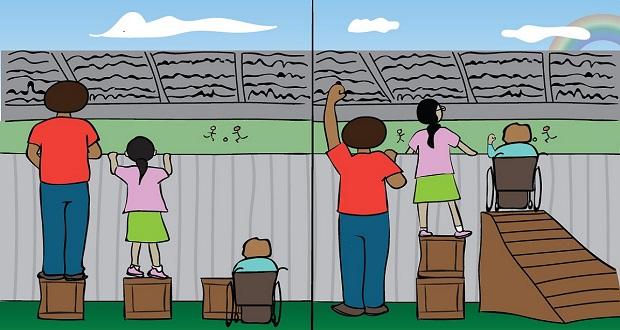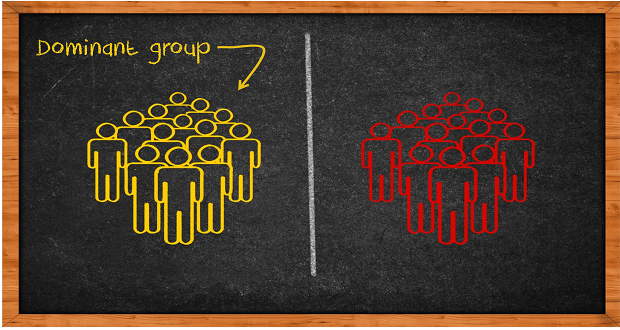The term microaggression was not familiar to me growing up in Detroit during the mid-1980s. Attending a diverse, Catholic school led me to believe the entire world held the same beliefs and values as our middle-class neighborhood.
The term microaggression was not familiar to me growing up in Detroit in the 1980s. Attending a diverse, Catholic school led me to believe the entire world held the same beliefs as our middle-class neighborhood. Share on XA microaggression is simply defined as the everyday, subtle, intentional or unintentional interactions or behaviors that communicate bias toward marginalized groups. The tricky part about a microaggression statement or action is that people who commit microaggressions might not understand how they are offending marginalized groups.
My first encounter with microaggressions was when I was working in a clothing store at a local mall. As I was folding the sweaters on the display wall my co-worker walked up behind me and asked with a grin, “Are you mixed?” Being the naïve 17-year-old that I was, I eagerly answered her question and responded with no. She challenged my response by asking yet another question of my identity. “So, are you fully Black?” she questioned again. Feeling proud to be a Black woman, I answered with a resounding “yes!” Then she proceeded to tell me how pretty I am — “for a Black woman.” I smiled and for about 10 seconds felt like the prettiest woman in the world. Then it hit me: That was not a compliment — that was a direct insult to my entire race.
She proceeded to tell me how pretty I am — 'for a Black woman.' I smiled and for about 10 seconds felt like the prettiest woman in the world. Then it hit me: That was not a compliment — that was a direct insult to my entire race. Share on XIs it that I can’t be attractive unless I have some other heritage running through my veins? The woman could have been deliberately vocalizing how she felt about all Black women … or honestly trying to give me a compliment. The statement haunted me for many years.
Fast forward to my career as a computer applications instructor. I was teaching computer science classes at a local community college when I was 29. Students came to the classroom door, took a step back, and asked if this was indeed Advanced Microsoft Excel. It would not have bothered me, but I noticed this happened several times during the next five minutes. Was the label on the door incorrect? Did it have a different title? Why the hesitation? I later came to realize that the students could not believe that a young Black woman could be teaching a college-level class in computer science (for credit).
Later while working at a prestigious university, I taught several computer classes for an IT department. I remember being so proud when I first landed my dream job. When class was over, evaluations were distributed to the students. My evaluations would say, “you’re so articulate” or “you speak so well” or “I could really understand you.” I remember asking my white colleagues if they had received similar comments on their evaluations. None of them had. I never understood why they evaluated me on my language and speech instead of how they could apply the skills for their work. After all, I was not there to present the information and be judged on my understanding of the English language.
My evaluations would say, 'you’re so articulate' or 'you speak so well' or 'I could really understand you.' None of my white colleagues had received similar comments on their evaluations. Share on XWhen I walk into a classroom or facilitate a discussion with a group, I wonder what statements or generalizations will be made about my teaching ability based on my identity.
Many marginalized people have some of the same interactions, if not more. Microaggressions are not always conveyed in language; it can be someone holding their purse tightly when someone from another race approaches. It manifests in a variety of ways — some subtle, others not.
Here is a short list of common microaggressions. Take a moment to look at how these statements could be offensive.
- “I don’t see you as Black,” or “I don’t see color.”
- “You’re not smart in math? But you are Asian.”
- “Can I touch your hair?”
- “You don’t sound Mexican.”
- “What are you?” or “Where are your people from?”
- “I’m not racist. I have a ______ friend.”
- “You have such a dark tan.”
- “You’re not like other gay people.”
- “I would never have guessed you were trans!”
- “Do you speak English?” — often asked to an Asian person
- Phrases such as: “That’s so gay” or “Indian giver”
- Situations such as: Faculty of color mistaken for a service worker, or an instructor tending to call on male students more frequently than female students
The Trouble? Microaggressions are like getting a small paper cut on your finger. One cut might not be so bad, but after several cuts it becomes cumulative over time. If someone says they don’t see you as Black, it might not offend you, but when experiences like this are commonplace, it can lower self-esteem and have you questioning the overall basis for the question.
Some people believe that microaggressions are subjective, but if the statement or behavior gives you an uncomfortable feeling, then trust your instincts! I teach in my classes the concept of intent vs. impact. The intent may not be to harm, but the impact is nevertheless the same.




















